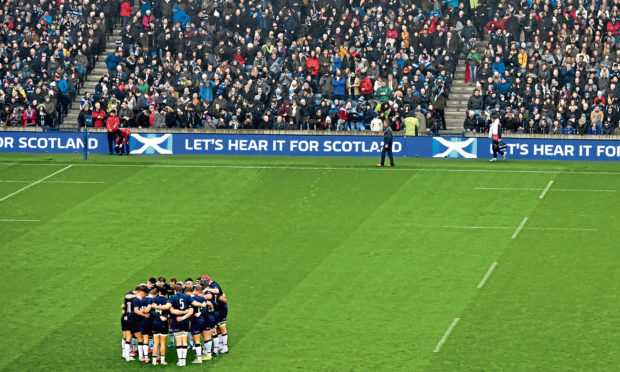Scotland’s tour of South Africa and New Zealand this summer “is almost certain not to take place”, the autumn tests are in danger and all high-earning players and Murrayfield staff will be asked to take pay cuts as the SRU struggles with the financial impact of the coronavirus..
A letter from Scottish Rugby chief executive Mark Dodson to staff and stakeholder clubs details the union’s new financial plan in the likelihood that the remaining rugby calendar in 2020 may not be able to take place.
Top executives, Scotland head coach Gregor Townsend and pro-team head coaches Dave Rennie and Richard Cockerill all agreed pay deferrals two weeks ago, but it seems these have now become direct pay cuts as financial hardship during the lockdown starts to bite at Murrayfield.
The chief executive, whose own pay has been the subject of considerable controversy after it was revealed in January accrued bonuses brought his remuneration to over £930,000 in 2019, has volunteered a 30% cut to his standard £450k salary.
Other executives have accepted a 25% cut in salary while all executive directors have waived their bonuses for the 2019-20 financial year.
The Chief Executive’s letter also revealed plans to furlough “a significant proportion” of their 450-strong staff, but states they are “confident” any employee earning less than £50,000 a year – three-quarters of the 450-strong staff – will be unaffected by their measures.
“Our income streams are being badly affected as match day receipts and other revenues from the likes of PRO14 and EPCR fixtures and activity that might otherwise be taking place at BT Murrayfield are interrupted,” writes Dodson.
“Like many we hope the professional game season can be completed, but have no guarantee that even a truncated end to any of the competitions will happen.
“As it now stands it would appear very unlikely the annual Summer Tours to the Southern Hemisphere will take place. This has a further impact on our income.
“There is also developing uncertainty on when Scottish Rugby might be able to put Autumn Test tickets on sale, and indeed if these games will go ahead as originally planned.”
This year’s three Autumn Tests at Murrayfield were scheduled for November against Argentina, New Zealand and Japan – all of which were likely to attract full houses of 67,000 spectators as well as considerable hospitality revenues and produce around £12 million in total to the union, he notes.
Dodson also reveals that there are 157 players currently under contract with the SRU, and that the organisation “will consult with all players and identified staff on a salary reduction programme focused on our higher earning employees and players.”
The SRU had previously indicated they were in a sound financial position after both home Six Nations games were played before this year’s championship was brought to a halt by the pandemic. The remaining revenues from those games, and the use of the furlough system, they hope, will prevent any redundancies.
However, this was always going to be a difficult year for Murrayfield with no money-spinning November internationals from 2019 because of the Rugby World Cup, quite apart from the expense incurred in playing in Japan.
The union is also still waiting for competition payments from the unfinished Six Nations, PRO14 and EPCR tournaments.
Dodson underlined that support for clubs would be maintained throughout the process.
“Our clubs are the bedrock of our sport and that is why one of our first actions was to introduce both the Club Hardship Fund and bring forward the Club Support payments into April to provide the reassurance of improved cash flow and wider financial support,” he continues.
“We will continue do what we can to support all clubs through these unprecedented times.
“Our players and our coaches cannot fulfil any fixtures and the money we normally expect to make from the professional and international game at this time of the year, and over the summer, has all but disappeared due to the challenges beyond our control.
“No one knows with any certainty when any rugby can resume.”
He notes the “many, many examples” of staff, clubs and players supporting local communities.
“Rugby makes a positive contribution to society and it is this positivity and our whole sport working collectively that will give us the best opportunity to come through this crisis, safely, together,” he concludes.
